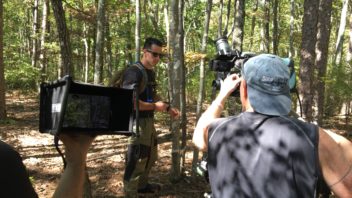 Sometimes clients feel that the only way to personally deliver their message to the audience is by reading a prompter and looking directly into the camera. With this style of delivery, you’re competing with the top professionals in televised presentation – TV News Anchors, Spokespeople, etc. The audience has a certain expectation for the intonation and style of delivery, and if that expectation isn’t met, you could misfire your message. Even professional presenters may be slightly flustered as the TV style presentation is quite different.
Sometimes clients feel that the only way to personally deliver their message to the audience is by reading a prompter and looking directly into the camera. With this style of delivery, you’re competing with the top professionals in televised presentation – TV News Anchors, Spokespeople, etc. The audience has a certain expectation for the intonation and style of delivery, and if that expectation isn’t met, you could misfire your message. Even professional presenters may be slightly flustered as the TV style presentation is quite different.
A sit-down interview allows you to deliver your message in a relaxed, conversational, and FUN manner. Some clients are uncomfortable going in to the interview because they think they have to prepare a script or deliver perfect details. Afterwards, they’re almost always surprised at the ease and comfort of this style.
The key to delivering the right message often depends on the experience of the interviewer rather than the interviewee. A good reporter knows how to get the subject to deliver the key lines. And, because the interview is not broadcast live, there is a tremendous amount of flexibility in editing the stallers – the “uhh’s”, the coughs, or the sentence fragments.
So here are a few tips to remember if you’re going to be interviewed.
• Never been interviewed before? No problem. Many of our clients had never been interviewed either, and they did just fine. We try to make you as comfortable as possible. It’s okay if you’re nervous, it usually passes once the interview gets under way.
• It’s just a conversation. Just talk as freely as if you’re talking to a neighbor about what you do.
• If you have key points you know you want to cover, let your interviewer know well in advance, so she can be knowledgeable enough to ask the right questions.
• Remember, with us, it’s not live television. Your interview is going to be chopped up, reordered, edited, and polished. Your interview may be ten minutes long, but what is actually used may only be two minutes long.
• Keep answers relatively short. Your interviewer will know what sound bite is needed and will continue prodding you until you say the line she’s looking for. Shorter more concise answers will make it easier for your audience to understand you.
• It’s okay if you feel an answer sounds repetitious. Most likely, if your interviewer is asking the same type of question, she’s looking for something in particular and it’s fine to be repetitious.
• Try not to look at the camera.
• Don’t worry about saying the “wrong” thing. If you say something you don’t like, try it again. The final piece will be edited to perfection and no will will ever know if you “flubbed” anything.


